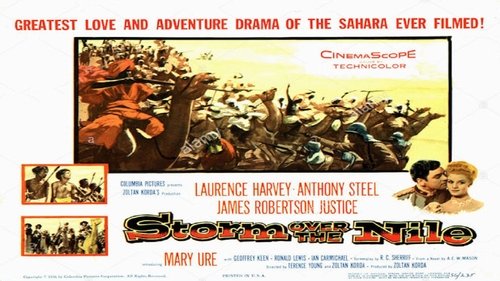tieman64
This is a review of "Storm over the Nile" (1955), "Khartoum" (1966) and "The Four Feathers" (2002), three films based on British actions during the Mahdist War (1881-1899).The 19th century saw colonial powers scrambling across Africa. As the British Empire expanded from Southern Africa to the Mediterranean, the Ottomans expanded from Turkey to Northern Africa and the French from West Africa to the Red Sea. All three would converge upon Egypt, which would continually shift hands between the three Empires.Britain eventually emerged victorious, becoming defacto ruler of Egypt in 1882. Egypt would henceforth become a base for further British expansion southward into Sudan. The Sudanese would attempt to fend off these advances. They'd rally behind Muhammad Ahmad, an Islamic messianic or "Mahdist" figure. Muhammad Ahmad was denounced by Sudanese elites, but embraced as a revolutionary leader by marginalised Nilotic tribes.Experts at using divide-and-rule tactics, the British divided Sudan into loosely demarcated northern and southern zones. The north became Muslim and Arab dominated and was integrated with the economic networks along the Nile. The south, steeped in poverty, was treated as an "African zone". A cocktail of Muslim, Christian and tribal groups, the south Sudanese were indoctrinated into thinking themselves culturally/biologically distinct and inferior. Promising independence and even salvation (he claimed to be paving the way for the Second Coming of Jesus Christ), Muhammad Ahmad set out to overturn this. Like the countless Christian messianic figures who sprung up as a result of Roman occupation, and a precursor to contemporary Islamic militants, he was the inevitable product of naked Imperialism.The city of Khartoum straddled northern and southern Sudan. To the North, the British suppressed the slave trade, heavily invested in social, educational and health services, and essentially nurtured a "liberalised" form of Islam. As colonialism recruitment policies favoured educated Arabs, a new socio-economic class was created so as to offer a bulwark against Mahdism and secular nationalism. An ideological bulwark, however, is no match for guns.In 1884, after a three month siege, Khartoum fell to the Mahdists, who stormed the city and executed British governor-general Charles Gordon. The Empire reacted swiftly. British forces under Herbert Kitchener rolled in and slaughtered tens of thousands of Sudanese. By 1898, most Mahdists were crushed. Sudan henceforth became subject to joint Anglo-Egyptian governance.Unsurprisingly, the British set out to exacerbate regional, religious and racial divisions amongst the Sudanese. In 1922, in what became known as the "Southern Policy", the Empire declared that southern Sudan would be considered a "Closed District". Islamic proselytisers were banned, Arabic languages and clothing were discouraged, and Christian missionaries were brought in to convert southerners. Meanwhile, southern Arab merchants were relocated to the north and interactions between the peoples of the north and the south were forbidden. Such segregationist policies were designed to keep the south economically backward and foster divisiveness.Today, little has changed in Sudan. Artificially carved out of a myriad of peoples, with more than 400 ethnic and linguistic groups lumped together within its borders, the country remains ravaged by the divide-and-rule tactics of modern neo-Imperialists. Milking the nation's oil fields and precious metals, the United States, and recently China, have today become expert at funding and arming militias and bloody regimes in both the north and south.Zoltan Korda would produce and co-direct "Storm Over the Nile" in 1955, a film based on "The Four Feathers", a 1902 novel by Alfred Mason. The plot? Refusing to sail with his regiment to the Sudan, Harry Faversham (Anthony Steel), the cowardly scion of a military family, overcomes his disgrace by travelling to Africa. Here he helps his regiment defeat Sudanese forces. As with many Imperialist adventures, the film glorifies queen and country, assumes the rightness of British rule, romanticises colonialism and posits loyalty and responsibility to the ruling classes as the highest ideal. Though stiff and dull in places, the film boasts several impressive action sequences, filmed in expansive Cinemascope.The 1950s/60s saw the release of numerous films which attempted to rejuvenate British nationalism and which were determined to white-wash the realities of colonialism ("Zulu", "North West Frontier", "Khartoum", "55 Days at Peking", "The Black Tent" etc). Supercharged by the civil rights and independence movements of the 1950s-60s, such perspectives were slowly contested ("Gandhi", "Guns at Batasi", "Burn!", "The Man Who Would Be King", "Passage to India" etc), eventually giving rise to the latest adaptation of "The Four Feathers", a 2002 film which was so politically correct as to be ridiculous.Directed by Shekhar Kapur, "The Four Feathers" (2002) tells virtually the same story as "Storm over the Nile". Here actor Heath Ledger plays Harry Faversham, who is no longer a "coward" but a man of conscience who has "ethical objections to colonialism". Harry travels to Sudan, where he befriends and fights alongside Africans and where he teaches us to question nationalism, exceptionalism and pride. Dull and conventionally shot, the film's attempts at "rectifying" its source material are mostly hokey. In some ways it is even more racist than Korda's film, Africans reduced to props, whole cultures reduced to ridiculous musical choices and second-hand "exotic" signifiers.Released in 1966, and directed by Basil Dearden, "Khartoum" stars Charlton Heston as Charles Gordon, a British General sent to Sudan to battle Muhammad Ahmad (Lawrence Olivier). Gordon valiantly defends a fortress in Kartoum, but is eventually overrun.By having its heroes outnumbered, like cowboys surrounded by hordes of manic Indians, "Khartoum" manoeuvres its audience into siding with colonialists. Elsewhere it uses Gordon's demise to criticise political leaders who refuse to rally behind valiant troops. Heston, who spent the decade battling hordes of on-screen "savages", is himself a caricature of British bravery, whilst Ahmad never rises above the level of black-faced bogeyman. Still, "Kartoum" has its merits. Impeccably shot, tense, filled with impressive battles and awesome landscapes, it remains the best of a certain brand of 1950s/60s, pro-Imperialist adventure.5/10 - Worth one viewing.

